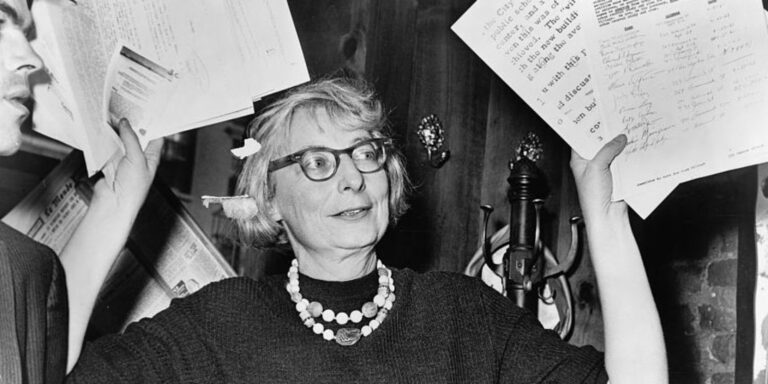Physical Address
304 North Cardinal St.
Dorchester Center, MA 02124
Physical Address
304 North Cardinal St.
Dorchester Center, MA 02124

At first blush, the enterprise of interpreting the Jane Jacobs’ work might seem like one best left to the proud and peculiar few, or to put it less charitably, those of us with nothing better to do. Yet the forces of history militate against this apathy: Jane Jacobs has emerged as quite possibly the most important figure in North American urban planning in the second half of the twentieth century. Her work is now taught in every urban theory and urban planning program worth its weight in ESRI access codes. She is responsible for introducing hundreds of thousands of people to planning and urbanism (including this author) and continues to shape how many of us think about cities. In one of my more popular blog posts here on Market Urbanism—and in a forthcoming book chapter—I argue that we should interpret Jane Jacobs as a spontaneous order theorist in the tradition of Adam Smith, Michael Polanyi, and F.A. Hayek. Built into her work is a profound appreciation of the importance of local knowledge, decentralized planning, and the spontaneous orders that structure urban life. Needless to say, this is not the prevailing interpretation of the importance and meaning of Jacobs’ work. Two very different alternative interpretations prevail. In this post, I argue that both interpretations are mistaken. Jane Jacobs, Form-Based Coder Many have taken Jacobs’ particular critiques of conventional U.S. zoning, often referred to as “Euclidean zoning,” as motivating a new form of zoning that takes into account her observations on design. In contrast to the mandates of Euclidean zoning, which proscribes land-use segregation and low densities, Jacobs celebrated mixtures of land uses and urban densities. Jacobs spends large sections of Death and Life discussing in detail particular urban designs that she sees as essential to fostering urban life. Much of “Part One” focuses on […]

This week on the Market Urbanism Podcast, I chat with Samuel Zipp and Nathan Storring on the wonderful new volume Vital Little Plans: The Short Works of Jane Jacobs. From Jacobs’ McCarthy-era defense of unorthodox thinking to snippets of her unpublished history of humanity, the book is a must-read for fans of Jane Jacobs. In this podcast, we discuss some of the broader themes of Jacobs’ thinking. Read more about the ideas discussed in this week’s episode: Pick up your copy of Vital Little Plans on Amazon. Mentioned in the podcast, Manuel DeLanda discusses Jane Jacobs in A Thousand Years of Nonlinear History. Read more about the West Village Houses here. The question of Quebec separatism is a fascinating—and under-considered—element of Jacobs’ work. Help spread the word! If you are enjoying the podcast, please subscribe and rate us on your favorite podcasting platform. Find us on iTunes, PlayerFM, Pocket Casts, Stitcher, and Soundcloud. Our theme music is “Origami” by Graham Bole, hosted on the Free Music Archive.